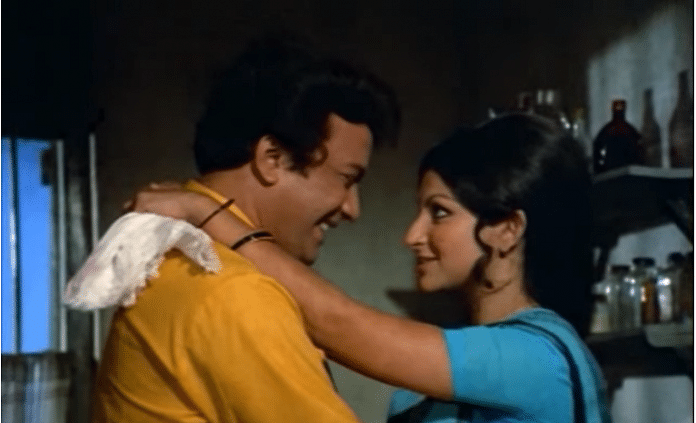Natural calamities always produce saviours who come from nowhere, overlook their own personal loss to help others. As Mumbai has flooded again at the onset of monsoon this week, many people relied on the kindness of strangers to help them get by. In a 1975 film called Amanush, it is once again a flood that restores faith in the boundless human spirit.
 Starring superstars of the time — Uttam Kumar, Sharmila Tagore, and Utpal Dutt — Amanush shows the story of a small village in the Sunderbans, known for its heavy rains and constant flooding. Uttam Kumar plays Madhusudan Roy Chaudhary, or Madhu, a man whose family were the zamindars of the village, but who is now reduced to a penniless drunkard. The source of his misfortunes is the village head, Maheem Ghoshal (played by Utpal Dutt), who tricked Madhu’s dying uncle to give his land and got Madhu arrested on false charges.
Starring superstars of the time — Uttam Kumar, Sharmila Tagore, and Utpal Dutt — Amanush shows the story of a small village in the Sunderbans, known for its heavy rains and constant flooding. Uttam Kumar plays Madhusudan Roy Chaudhary, or Madhu, a man whose family were the zamindars of the village, but who is now reduced to a penniless drunkard. The source of his misfortunes is the village head, Maheem Ghoshal (played by Utpal Dutt), who tricked Madhu’s dying uncle to give his land and got Madhu arrested on false charges.
Sharmila Tagore plays Rekha, the local school teacher, who was in love with Madhu, but ignores him ever since his stint in jail. Upon the arrival of a new inspector in the village, Ghoshal tries his best to bribe the inspector and turn him against Madhu, who is the only one who stands up to Ghoshal and his henchmen as they swindle and beat people up for money. While the inspector is swayed at the start, he realises the truth soon enough and helps Madhu get his life back on track. He helps Madhu and his friends get a contract to build a dam near the village, which he does and wins back the love of the village and Rekha. But when floods threaten to ruin the dam and the village, Ghoshal once again, tries to turn everyone against Madhu, who rises to the occasion and saves everyone.
Also read: As Chennai grapples with water crisis, Do Boond Pani shows what Day Zero can look like
Directed and produced by Shakti Samanta in both Bengali and Hindi (the film was so popular that it was remade in Telugu, Tamil and Malayalam), the film’s plot line is simple enough, but it’s the complexity of human emotions depicted that makes it a classic. Madhu is an inherently good person, who is always looking to help people, but the way society treats him by believing the lies Ghoshal spins, transforms him into a cynic. He takes to alcohol to numb the sting of resentment and the sadness of being completely discredited in the blink of an eye. The inspector (Anil Chatterjee) is also an important catalyst for Madhu’s change and symbolises what miracles a little faith in people and a little hard work can achieve.
Uttam Kumar does a brilliant job of bringing out the angst and the anger of the character, while also making you empathise with him throughout. Sharmila Tagore’s Rekha is a strong woman, who is conflicted between her love for Madhu and the hurt of his betrayal. Utpal Dutt as the vicious villain is the one who shines throughout the film, and actually makes you forget that it is the same Utpal Dutt who was a master comedic actor.
Also read: In Manthan, Girish Karnad showed why change matters through the Amul story
The music by Shyamal Mitra, sung by Kishore Kumar and Asha Bhosle, is another noteworthy feature of the film, as it was a big hit in both Hindi and Bengali. The authenticity is brought out well, as the director chose to actually shoot in the Sunderbans.
Madhu’s journey gives us is the kind of faith we need in this time of impending doom with floods and droughts wreaking havoc in the country.




Cover picture is not from the film Amanush. It is from Shakti Samanta’s another film called Ananda Ashram.